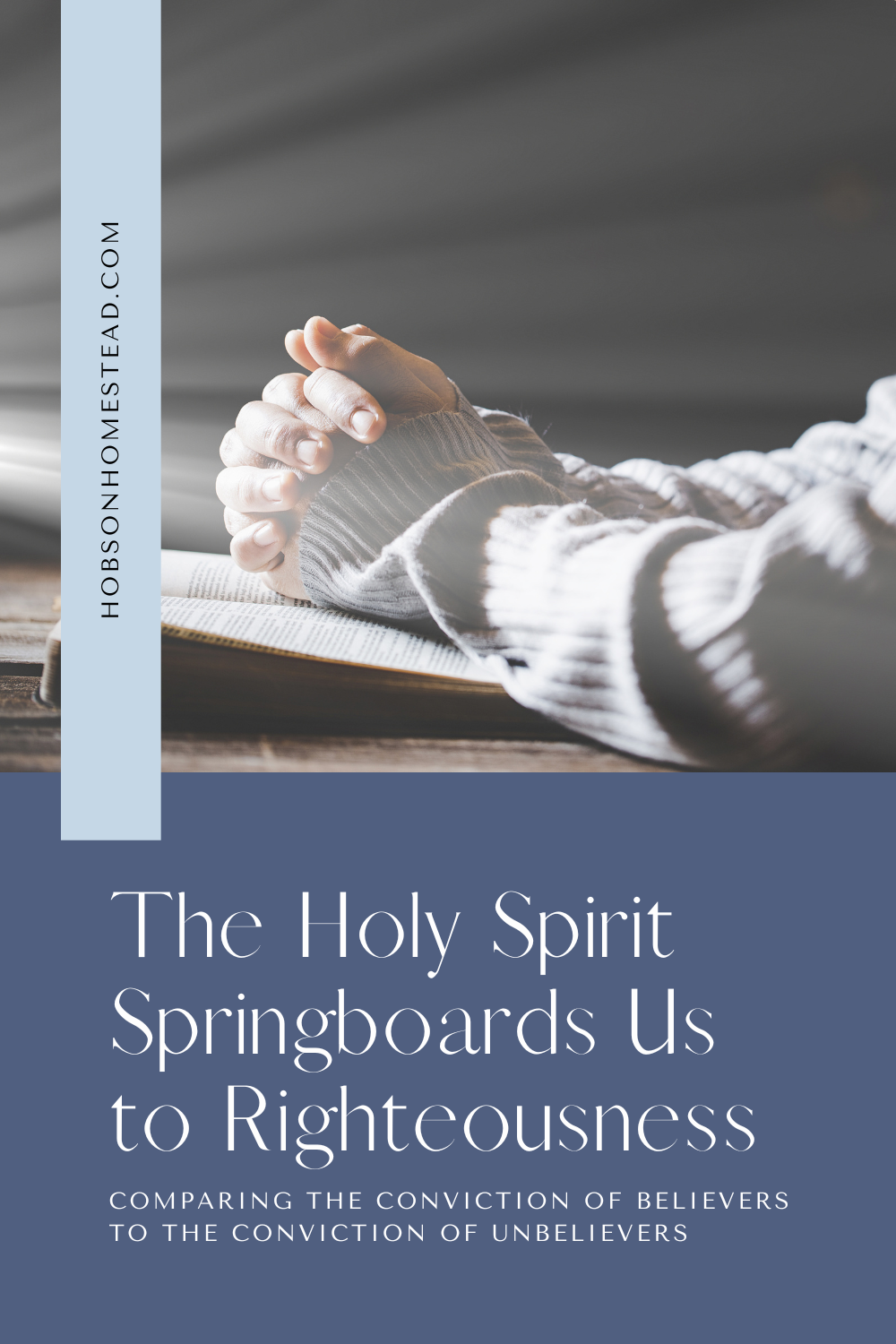The Holy Spirit convicts unbelievers of their sin, but believers of their righteousness. Alternatively, Satan condemns believers to tie them down, while commending unbelievers of their disbelief to keep them in darkness.

The 2022 findings of American Bible Society’s State of the Bible Report indicated that nearly 26 million Americans (a 10% decrease) reduced or stopped their interaction with Scripture in since 2021.
The survey found that it wasn’t just the occasional Scripture readers who didn’t pick up their Bibles as much last year. Astonishingly, more than 13 million of the most engaged Bible readers admitted to reading God’s Word less.
In 2022, only 10% of Americans reported daily Bible reading. Before the pandemic, that number was at around 14%.
I’m not sharing these stats to make you feel bad, but these stats are very telling of where America is headed.
I had a Bible teacher come to me in my mid 30s when I was going through a hard season and ask: Haley, are you reading the Bible on your own each day?
And even though I was being led through the Bible by guided studies seasonally and sermons weekly, I wasn’t reading it for myself (here’s my story). And I still remember that feeling I had when she asked me that. She wasn’t accusatory, but I had been called out. I had that sinking, pit-of-your-stomach feeling that jolted me out of my complacency.
But the thing is, she wasn’t asking that to condemn me. Instead, she actually cared about me.
How do I know that? Because the Bible says so:
“Therefore, there is now no condemnation for those who are in Christ Jesus.”
Romans 8:1
How Satan Condemns Believers vs. Unbelievers
Instead, Satan is the one who condemns us and brings guilt and shame. He accuses us so that we feel beaten and broken, hated and hopeless. Why? Because it holds us back from doing God’s will. It’s restraining—and because the chains of condemnation hold us back and tie us down, both literally and figuratively. They forget the truth of God’s grace and Jesus’ finished work on the cross.
And so Satan condemns the believer (to hold us down and keep us captive), but commends the unbeliever by telling him he’s not condemned, because that lie keeps the unbeliever captive. He insinuates that no repentance is necessary and there is no need for the sacrifice of Jesus. The unbeliever is free to do anything he wants without consequences, because he creates his own truth and his own morals.

How the Holy Spirit Convicts Believers vs. Unbelievers
But when we talk about the Holy Spirit, we use the word conviction—not condemnation. Instead of holding us back, conviction is helpful and hopeful. It gives us a path forward in repentance. It convinces us of a better way.
The Greek word (elegcho) used for convict in the Bible means to bring to light or to expose.
So when we think of light as it relates to the believer and the unbeliever, we are apt to recall one of the many passages from the book of John about light.
Everyone who does evil hates the light, and will not come into the light for fear that their deeds will be exposed. But whoever lives by the truth comes into the light, so that it may be seen plainly that what they have done has been done in the sight of God.
John 3:20-21
So the unbeliever walks in darkness because sin separates him from God and the saving grace of Christ, who is light incarnate. Contrarily, the believer walks in the light because Christ lights his path.
John 8:12 says: “Again Jesus spoke to them, saying, ‘I am the light of the world. Whoever follows me will not walk in darkness, but will have the light of life.'” And this is exactly why Jesus came: so that we wouldn’t have to walk in darkness. “I have come into the world as light, so that whoever believes in me may not remain in darkness” (John 12:46).

So the Holy Spirit plays the lead role in conviction—the process of bringing to light—in both the life of the unbeliever and the believer.
Nevertheless, I tell you the truth: it is to your advantage that I go away, for if I do not go away, the Helper will not come to you. But if I go, I will send him to you. 8 And when he comes, he will convict the world concerning sin and righteousness and judgment: 9 concerning sin, because they do not believe in me; 10 concerning righteousness, because I go to the Father, and you will see me no longer; 11 concerning judgment, because the ruler of this world is judged.
John 16:7-11
John writes that the Holy Spirit convicts of three things: sin, righteousness and judgment. But notice how the text is broken up with semicolons.
- The Holy Spirit convicts the world of sin (v. 9)
- The Holy Spirit convicts the believer of righteousness (v. 10) [Jesus is speaking to his disciples in this passage, so “you” is plural and understood as believers because his disciples were believers. ]
- The Holy Spirit convicts the devil (or “ruler of this world”) of judgment (v. 11)
If we break it down, we see that the Holy Spirit convicts the unbeliever—the person of the world—of his sin. Notice the singular use of the word “sin.” This is not individual sins or multiple sins, but the Holy Spirit convicts the unbeliever of his innate, flawed, sinful nature.
This innate sinful tendency is the very definition of original sin. It’s the Christian doctrine stating that since the fall (which was the first sin of Adam and Eve in the Garden of Eden), all humans are born into sinfulness.

When we look at the singular version of original sin mentioned in John 16, we realize the significance of there only being a singular answer for it: Christ. Simply put, Christ’s once-and-for-all death on the cross is the only way for humans to atone for our sinful nature.
So the Holy Spirit exposes this idea of an inherently sinful nature to the unbeliever to show him his unbelief, to turn him to Christ through repentance and to reveal his need for salvation. The hope is that the unbeliever will recognize this exposure of his sin and be brought out of darkness and into the light with Christ.
But when we talk about believers, those who are already walking in the light with Christ, the Holy Spirit convicts us of our righteousness. This conviction still brings us to turn to Christ, but we are not found guilty (as in the case of the unbeliever) because Jesus’ finished work on the cross already erased that guilt. We have already acknowledged our original sin, repented of it and turned to Jesus. We have been justified in Christ.
So the Holy Spirit convicts us of our righteousness because Christ is righteous and we are to look to him as our example. When we were saved, God declared us righteous and justified because of Christ. (Romans 5:1)
In verse 10, Jesus also told his disciples that he was going away and would no longer act as their example here on Earth. But he was sending them the Helper, Advocate, Comforter, Encourager, Counselor as their helper. This is the role of the Holy Spirit in the life of the believer.
So when the Holy Spirit convicts us of something in our lives as believers, we’re to use that nudging as a springboard. Instead of feeling condemned and immobile (how Satan wants us to feel) we should springboard to change and conformity to Christ—because Christ is our greatest example, our standard of righteousness and we are called to be Christlike.
When we think of the conviction from the Holy Spirit in the lives of believers, we can consider how it fits into the three phases of salvation: justification, sanctification and glorification.
- Dead in Sin: So when we are still an unbeliever and dead in our sins, the Holy Spirit convicts us to bring to light our inherently dark and sinful nature so that we turn to Christ (our light) and recognize our need for his saving grace.
- Justification: After we are saved or justified in Christ, conviction from the Holy Spirit reminds us of our righteousness because of who we are in Christ positionally and our new covenant relationship with him.
- Sanctification; As we are being continually conformed to the image of Christ during our lifetime on earth as believers, God uses the Holy Spirit as one way to sanctify us. The Holy Spirit will help convict us of our righteousness by teaching us, guiding us, revealing God’s word to us and more.
- Glorification: Once our physical bodies die, we will be in a permanent, perfected stage with Christ. There is a hopefulness in the Holy Spirit’s conviction of believers because we have the reassurance of God’s promise of eternal life.
